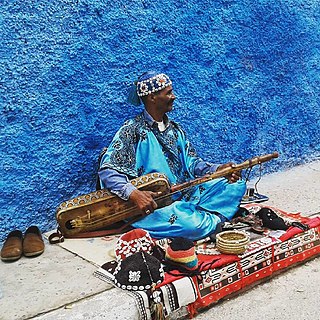Top Qs
Timeline
Chat
Perspective
Gnawa
Ethnic group of Morocco From Wikipedia, the free encyclopedia
Remove ads
The Gnawa (/ɡ(ə)ˈnɑːwə/) (or Gnaoua, Ghanawa, Ghanawi, Gnawi'; Arabic: ڭناوة, romanized: Gnāwa) are an ethnic group inhabiting Morocco, that had been brought as slaves from the West African Sahel.
This article includes a list of general references, but it lacks sufficient corresponding inline citations. (March 2013) |

The name Gnawa originated in the indigenous languages of North Africa and the Sahara Desert. The phonology of this term according to the grammatical principles of Berber is agnaw (singular) and ignawen (plural), which means "black person."[1]
Gnawa music was inscribed in 2019 on the Representative List of the Intangible Cultural Heritage of Humanity.[2]
Remove ads
History
The Gnawa population is generally believed to originate from the Sahelian region of West Africa, which had long and extensive trading and political ties with Morocco.[3][4] The Gnawa are an ethnic group who were brought to Morocco as slaves, and their ancestry is traced to parts of West Africa. After the abolition of slavery, they became a part of the Sufi order in the Maghreb.[5] While adopting Islam, the Gnawa continued to celebrate ritual possession during rituals which were devoted to the practice of dances of possession and fright. This rite of possession is called Jedba (Arabic: جدبة).
Remove ads
Gnawa and music
Summarize
Perspective
Gnawa music mixes classical Islamic Sufism with pre-Islamic African folk traditions. The term Gnawa musicians generally refers to people who also practice healing rituals. The healing rituals have apparent ties to pre-Islamic African animism rites known as Bori in the Hausa culture. In Moroccan popular culture, Gnawas, through their ceremonies, are considered to be experts in the magical treatment of scorpion stings and mental illness. They heal diseases by the use of colors, condensed cultural imagery, perfumes and fright.
Gnawas play deeply hypnotic trance music marked by low-toned, rhythmic melodies played on a skin-covered lute called a sintir or guembri. The method, similar to garaya in Hausa traditional music, involves call-and-response singing, hand-clapping, and cymbals called krakeb (plural of karkaba). Gnawa ceremonies use music and dance to evoke ancestral saints who are said to perform the healing.
Gnawa music has won an international profile and appeal. Many Western musicians, including Bill Laswell, Brian Jones, Randy Weston, Adam Rudolph, Klaus Doldinger, Tucker Martine, Robert Plant, Jacob Collier and Jimmy Page, have drawn on and collaborated with Gnawa musicians such as brothers Mahmoud Guinia and Mokhtar Gania of Essaouira, brothers Mustapha Baqbou & Ahmed Baqbou, Abdelkebir Merchane, Brahim Belkani, all from Marrakesh, as well as Hamid El Kasri and Abdelkader Amlil of Rabat and the late Ahmida Boussou and Saïd Oughassal of Casablanca, who have all participated at the annual festival in Essaouira. Some traditionalists regard modern collaborations as a mixed blessing, leaving or modifying sacred traditions for more explicitly commercial goals. International recording artists such as Hassan Hakmoun have introduced Gnawa music and dance to Western audiences through their recordings and concert performances.[6]
The centres for Gnawa music are Marrakesh, Tangier, Rabat, Casablanca, Fez and Essaouira, which is in the southwest of Morocco where the Gnaoua World Music Festival is held annually. The Gnawa of Marrakesh hold their annual festival at the sanctuary of Moulay Brahim in the Atlas Mountains and around the sanctuary of Moulay Abdullah bin Tsain in the village of Tamesloht, between Marrakesh and the town of Amizmiz. The festivals take place in connection with the birthday of Muhammad.
The Gnawa of Khamlia hold their annual festival in August at the village of Khamlia in Erg Chebbi.[7]
Finally there is also a special tribe inside Gnawa called Ganga. The Ganga are of subsaharan African origin and typically speak Tashelhait, and are found in Haha between Essaouira and Agadir and in the Sous Valley around towns like Agadir and Taroudant. They do not play the guimbri but only focus on the dance known as kouyou, playing krakeb and the large drums called tebel or ganga, which is also part of the procession of the regular gnawa ceremony.
- Gnaoua in a North African Interior
- Gnawa from Algiers with his guembri (circa 1906) by Jean Geiser (1848-1923).
- Gnawas circa 1920s
- Music Teacher
- Gnawa Musicians, by Harry Humphrey Moore.
- A group of Gnawas dance to a song.
Remove ads
See also
References
General references
Further reading
External links
Wikiwand - on
Seamless Wikipedia browsing. On steroids.
Remove ads








